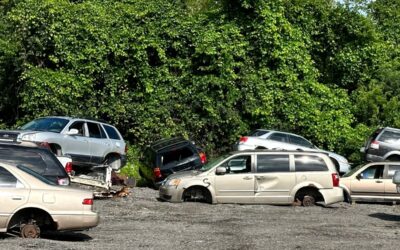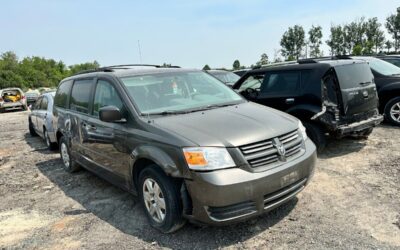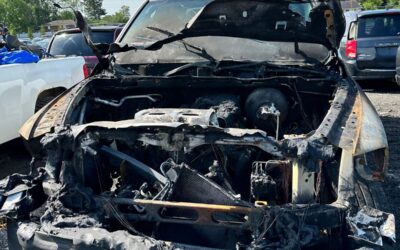Introduction
When your car starts having constant issues, you may wonder if it’s best to repair or scrap it. Many car owners spend thousands of dollars to keep an old vehicle running. They don’t realize that the cost of repairs has already surpassed the car’s actual value. Therefore, it’s best to know when to stop investing in repair work and scrap your car.
In this blog, you will learn about the most common signs that indicate it’s time to scrap your car. The mechanical issues can affect your safety in the car and also cost you more in the long run. You will also learn why scrapping a car makes sense in some cases and how it can even help you get some money back. This guide is especially helpful if you live in the Greater Toronto Area, where winters and road salt can damage cars faster than usual. So, let’s break down each major fault in detail so you can make the right decision.
1. Engine Problems
The engine is the most expensive part to repair or replace. When the engine starts failing, it’s due to a blown head gasket, a cracked engine block, or repeated overheating. The repair cost can reach anywhere from $4,000 to $10,000 in Canada. That’s often more than what the entire car is worth, especially for older models. Leaks, burning oil, or knocking sounds usually point to major engine damage. Once your mechanic mentions full engine rebuilds, it’s a clear sign that continuing to repair the car doesn’t make financial sense.
2. Transmission Failure
If your car’s transmission is not working properly, you will likely face high repair bills and unreliable performance. The transmission controls how power from the engine reaches the wheels. If you feel your car is not shifting gears smoothly or if you hear strange noises while driving, these may be signs of transmission trouble. In some cases, you may also notice a burning smell from the fluid, or the car may stop moving completely. Replacing a transmission in Canada can cost between $2,500 and $5,000 or more. For vehicles with high mileage or older age, it’s not worth the cost. Transmission repairs are complex and risky, and if your car already has other problems, it’s usually better to scrap it than invest more money in repairing.
Also Read: Should You Fix Your Car Before Scrapping It?
3. Rust and Frame Damage
Winter roads in Canada are heavily salted, which speeds up rust, especially under the vehicle. Rust isn’t just about the appearance of the car; it spreads to the car’s frame, suspension mounts, or brake lines. Holes in the floor, crumbling rocker panels, or rusted wheel wells are red flags. Frame repairs are difficult, expensive, and not always effective. Most body shops will suggest scrapping in cases of deep rust damage because fixing it won’t restore the car’s safety.
4. Electrical System Failure
When your car has multiple electrical system problems, the cost of repairs adds up quickly. Newer cars depend on electrical systems for almost everything, including the dashboard, windows, mirrors, locks, ignition, and even the steering. If the dashboard lights fail, the windows stop working, or the battery keeps dying, it might be due to a wiring issue or a faulty ECU (Engine Control Unit).
Replacing these parts can cost thousands of dollars. Also, replacement parts may not be available for older vehicles anymore. If your mechanic tells you the issue is electrical and not easy to find, it means you will have to spend a lot just to find the exact problem. This is another sign that it may be better to scrap your car instead of chasing repair after repair.
5. Brake System Failure
The brake system is important for safety, and if it doesn’t perform well, you are putting yourself and others in danger. Spongy pedals, leaking fluid, grinding noises, and ABS warning lights are all signs that something’s wrong. Brake repairs, especially if the calipers, rotors, and lines are involved, can cost over $2,000. In old vehicles, these issues keep returning. When brake system issues become regular, and the car has other faults too, it’s a strong reason to stop fixing and lock the scrapping option.
Also Read: Do I Need a Safety Inspection to Sell My Car ‘As Is’ in Ontario?
6. Suspension and Steering Problems
A car that bounces, leans, or shakes while driving is uncomfortable and unsafe. Worn shocks, broken struts, and loose steering components don’t just make your ride rough, they can lead to tire damage and loss of control. These repairs are expensive and are the sign that your car has reached the end of its life. Mechanics often find more hidden problems when working on old suspension systems.
7. Frequent Overheating
Overheating may appear like a small issue at first, but if it keeps happening, the cause is likely serious. A clogged radiator, damaged thermostat, leaking coolant, or head gasket failure can all lead to a hot engine. Each time your car overheats, the engine gets weaker. In older vehicles, the risk of total engine failure increases quickly. Constant overheating is not just annoying; it’s a signal that you need to scrap your vehicle.
8. Repeated Emissions Test Failure
In Ontario, your car needs to pass emissions testing to stay legally drivable. When it fails, it usually means expensive repairs to the exhaust, sensors, or catalytic converter. Some older vehicles just can’t meet the newer standards anymore. If you are spending money and still getting poor test results, it’s probably time to move on. A car that can’t pass emissions legally can’t stay on the road, so scrapping becomes the most practical option.
Also Read: Top 10 Reasons to Scrap Your Old Car in GTA and Get Instant Cash
9. High Mileage and Age
Once a car passes 250,000 kilometers, almost every part is already damaged. At that point, it’s common to face repeated issues with fuel pumps, starters, sensors, batteries, and more. Even small repairs start to feel like a burden because they come one after another. Insurance coverage also drops for older, high-mileage vehicles, leaving you at more risk. Instead of investing money into a car’s repair, many car owners choose to scrap it.
10. No Resale or Trade-In Value
Every car reaches a point where selling or trading it in brings little to nothing. That usually happens when a car has too many mechanical problems, visible damage, or just isn’t in demand anymore. You can check the resale value using tools like AutoTrader or Canadian Black Book. If fixing just one issue costs more than what your car is worth, that’s a clear sign that it’s time to scrap. Auto recyclers can still offer cash for their metal and working parts.
Conclusion
When problems start stacking up and the cost of repairs goes far beyond the car’s value, scrapping becomes the right option. It saves you from ongoing expenses, keeps you safe, and clears up your parking space. Whether your car has a failing engine, rusted frame, or electrical issues that never go away, holding onto it just delays the unavoidable.
For car owners, Greenway Auto Recycling makes this process easy. We offer fast and reliable scrap car removal services across cities like Toronto, Mississauga, Brampton, Vaughan, and more. Greenway offers free towing and fair cash offers and handles all the paperwork. We accept all kinds of vehicles, no matter if they are non-functioning or broken. If your car keeps breaking down, stop spending on repairs. Reach out to us today and turn that old vehicle into instant cash.





